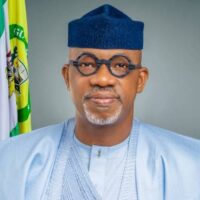Dasuki: Enemy Or Friend?
Dasuki: Enemy Or Friend?
Monday, February 16, 2015 2:59 pm
Also, 26 registered political parties, most of which are not fielding candidates for presidential elections, had threatened at a press conference in Abuja that to boycott the polls if INEC did not shift the date. The representatives of the parties argued that INEC should postpone the elections because of the security situation in the country, low distribution of PVCs and people deserting their places of abode for their villages. According to him, INEC should shift the date of elections to sometime in March or April in accordance with Section 132(2) of the Constitution as amended which states: “An election to the said office (President) shall be held on a date not earlier than 150 days and not later than 30 days before the expiration of the term of office of the last holder of that office” gives INEC enough room to maneuver in terms of fixing of the date for the election. Not everyone agreed with the calls.
Chekwas Okorie, the presidential candidate of the United Progressive Party, described the reasons given by the proponents of the postponement that a great number of Nigerians will be disenfranchised having not been given their Permanent Voter Cards which will enable them to participate in the election is a contrived reason and to a large extent pedestrian. “As we speak, over 80 per cent of registered voters have received their PVCs according to latest figures released by INEC and this may increase to 90 per cent or above after the close of distribution of PVCs on February 8 2015, as planned by INEC,” Okorie said. With INEC unyielding to the demands, the battle to get INEC to buy into the plot to shift the election moved to the National Council of State believed to be convened for the purpose of discussing the time table for the elections on Thursday, 5 February.
From Poor Distribution of PVCs to Security
Ahead of the meeting, as Jega later told members of the Council made up of former and incumbent Heads of State, former Chief Justices of the Federation, state governors Sambo had written to him asking INEC to shift the election, this time around using the bogey of security. Jega in a brief presentation to the council titled, “Preparations for the 2015 General Election: Progress Report”, affirmed the readiness of INEC to proceed with the elections though the state of preparedness of the Commission may not be 100 per cent or perfect. But Jega said the Commission might not be willing to go ahead with the elections based on a security report he had received from the Office of the National Security Adviser (ONSA) the day before on four states in the North-east.
According to him, the Commission had the day before the meeting received a letter from the Office of the National Security Adviser informing it of recent developments in four of the North-east states, stating that safety and security cannot be guaranteed during the proposed election period. The INEC Chairman said the NSA in the letter had adduced reasons why the scheduled elections cannot go ahead while strongly advising that INEC considers rescheduling the elections by at least six weeks within the provisions of the electoral legal framework.
Jega said the NSA expressed the hope that sufficient normalcy would have been restored to the areas under Boko Haram occupation in the North East for elections to hold after six weeks. It was gathered that President Jonathan had argued forcefully for the postponement of the elections in order to guarantee the security of voters and officials that would be deployed for electoral duties in the North East. The President, it was also learnt, also noted that going ahead with the polls would mean the exclusion of the states in North East.
This will mean not just the disenfranchisement of millions of voters in that region, but could be a ground for the challenge of the legitimacy of the polls. It was learnt that the position of the President was backed by most PDP governors at the Council meeting.
In contrast, governors of APC who were led to the meeting by Buhari had argued that the insecurity in about 14 Boko Haram-occupied local government areas out of 774 in the country should not lead to a shift in the dates of the elections. It was gathered that the former military heads of state and other members of the Council present at the meeting agreed that fears over security concerns in the North-east could not be ignored. But members who could not agree advised Jega to proceed with the elections as scheduled in other states of the federation.
The disagreement among Council members on whether to go ahead with the elections as previously scheduled or not was reflected in the conflicting information about the outcome of the meeting at a joint press briefing by Imo State Governor, Rochas Okorocha, and his Ondo State counterpart, Olusegun Mimiko.
While the Imo State governor told journalists that the Council advised INEC to perform its civic responsibility with regards to the elections, Mimiko said INEC was advised by the Council to further consult with other stakeholders on whether to go ahead with the election or not based on the information made available to it at the meeting.
The Ondo State Governor however did not fail to add that: “No matter the extent of our readiness, if there are serious security concerns, the successful conduct of free, fair, credible and peaceful elections will be greatly jeopardized.”


 37 mins ago
37 mins ago  13 hours ago
13 hours ago  13 hours ago
13 hours ago  13 hours ago
13 hours ago  15 hours ago
15 hours ago  16 hours ago
16 hours ago  16 hours ago
16 hours ago  17 hours ago
17 hours ago
Join The Conversation